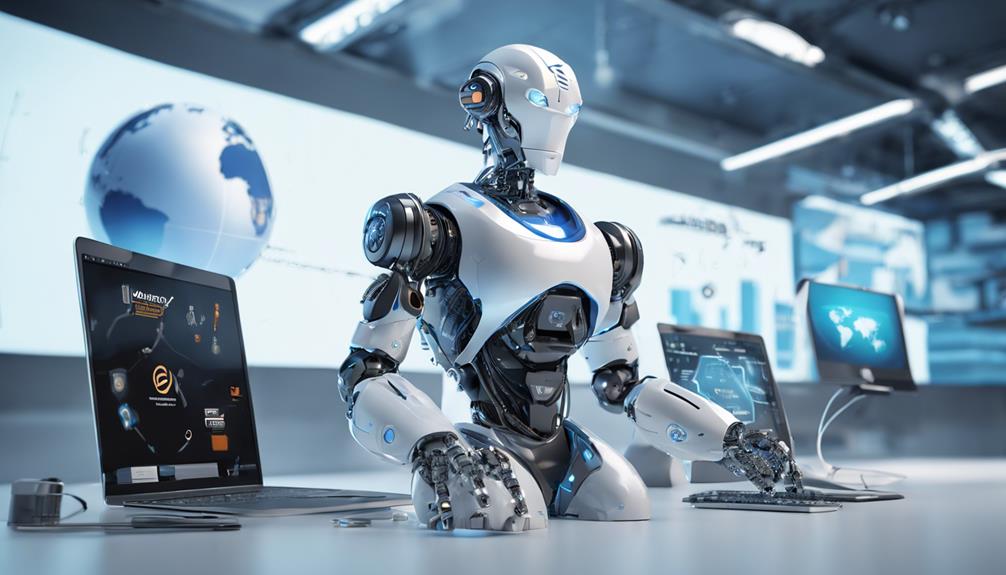
As you dive into the AI race, it's clear that giants like Google, Amazon, Microsoft, and IBM are leading the charge, each bringing unique innovations to the table. Google's DeepMind has made significant waves with its AlphaGo and AlphaFold projects, while Amazon leverages Alexa's widespread use to enhance daily life through AI. Microsoft integrates AI deeply with its Azure services, broadening its impact across various tech sectors. Meanwhile, IBM's historical strength in machine learning continues to influence its robust AI applications. Keep exploring to uncover which powerhouse might pull ahead in this dynamic technological showdown.
The Contenders in AI Leadership

Several tech giants are currently leading the race in AI development, each bringing unique innovations to the table. You might notice how Amazon is leveraging its vast cloud infrastructure to enhance its AI capabilities. They're not just about providing storage; they're integrating AI into their cloud services to offer advanced analytics and machine learning solutions. It's a game changer for businesses relying on Amazon Web Services.
Then there's IBM. Remember Watson? It's grown beyond winning 'Jeopardy!' IBM has pushed it into healthcare, where it helps doctors diagnose diseases faster than ever. But that's not all. They're also pioneering in the field of quantum computing, which promises to take AI to a whole new level.
Don't overlook Microsoft, though. Their Azure AI platform is empowering companies to deploy AI solutions at scale. Microsoft's approach focuses on democratizing AI, making it accessible to more developers through user-friendly platforms and tools.
As you see, it's not just about who's the most data, but who uses it most effectively. Each contender has its strengths, and it's fascinating to see how they play their cards in this high-stakes tech race.
Google's DeepMind Innovations
While Amazon, IBM, and Microsoft have made significant strides, Google's DeepMind stands out with its groundbreaking AI innovations. You've probably heard about AlphaGo, the first computer program to defeat a human professional Go player, a feat previously thought to be decades away. But DeepMind's ambitions don't stop at games. Their AI technology is also making waves in health care, where it's used to predict patient deterioration faster than existing methods.
You might find it fascinating how DeepMind applies its AI to solve complex scientific problems. For instance, AlphaFold, their latest venture, has made a significant impact in biology by predicting protein structures with incredible accuracy. This breakthrough has the potential to accelerate drug discovery and unravel the mechanisms of complex diseases.
What's even more impressive is how DeepMind's AI learns and improves. They use advanced techniques in machine learning, particularly deep reinforcement learning, where systems learn to make decisions by trial and error, gradually improving their accuracy. This approach isn't just about winning games; it's about solving real-world problems.
DeepMind's leadership in AI isn't just about developing technology; it's about applying it pragmatically to areas that profoundly affect human lives, putting them a step ahead in the AI race.
Amazon's Alexa and Beyond

In addition to its popular voice assistant, Amazon's Alexa, the company has expanded its AI capabilities into diverse sectors including smart home technology and healthcare innovations. You've probably interacted with Alexa, asking for weather updates or playing your favorite tunes.
But did you know that Alexa is now a gateway to a more connected and intuitive home environment? Amazon's smart home devices, managed via Alexa, allow you to control lighting, security systems, and even thermostats with simple voice commands.
Beyond convenience in daily tasks, Amazon's leap into healthcare is reshaping patient care. Imagine a world where your health data, collected through AI-driven devices, informs personalized treatment plans directly communicated through Alexa. This isn't just convenient; it's a game changer in preventive health and chronic disease management.
Amazon's AI doesn't stop here. They're constantly innovating to integrate AI more deeply into logistical operations, enhancing delivery efficiency and customer satisfaction. This means that what you order might arrive faster than ever before, with systems optimized to predict and respond to your needs.
As you see, Amazon isn't just about selling products; it's about integrating AI to make your life easier and healthier. What could they think of next?
Microsoft's AI and Cloud Integration
As Amazon innovates with Alexa, Microsoft isn't far behind, enhancing its own AI through sophisticated cloud integration. You're seeing a powerful synergy between AI capabilities and cloud services, particularly with Azure, Microsoft's ever-expanding cloud platform. This integration empowers you with more seamless AI solutions, boosting efficiency and innovation in your business operations.
Microsoft's strategy involves infusing AI into virtually all its products and services. For instance, Azure AI is a suite of AI services designed for developers and data scientists. It includes tools like Azure Machine Learning, which allows you to build, train, and deploy machine-learning models using the same tools and frameworks you're already familiar with. You can harness these tools to analyze data, predict trends, and make more informed business decisions.
Moreover, Microsoft's AI doesn't stop at just business applications. It extends to consumer services and operating systems, integrating AI into Windows and even Xbox, enhancing your user experience with more personalized and responsive features.
This breadth of integration showcases Microsoft's commitment not just to participate in the AI race, but to lead it, shaping the future of technology as you know it.
The AI Ambitions of Facebook

Facebook is rapidly advancing its AI technology to revolutionize how you connect and interact on social media. The company's vision extends beyond just optimizing your news feed; it's about creating an intelligent, responsive environment that anticipates your needs.
Imagine logging in and finding content that's not only tailored to your tastes but also suggests new interests you're likely to embrace. This isn't about bombarding you with ads—it's about enhancing your social experience in a meaningful way.
Behind the scenes, Facebook's AI algorithms are busy learning from vast amounts of data. They're improving how they understand text, images, and videos to create a more immersive and personalized interface. The AI isn't just recognizing faces or tagging friends anymore; it's analyzing the nuances of human emotion and interaction to foster deeper connections.
Moreover, Facebook is pushing boundaries in natural language processing to make interactions with AI as seamless as talking to a friend. This technology powers chatbots that provide instant customer service or offer companionship, transforming the way you think of digital communication.
As these technologies mature, you'll find your online world increasingly intuitive, less intrusive, and more engaging.
Apple's Approach to User-Centric AI
While Facebook focuses on social media enhancements, Apple takes a different tack, prioritizing your privacy and user experience in its AI developments. Unlike competitors who harvest vast amounts of personal data to feed their AI models, Apple's strategy hinges on processing data locally on your device. This approach minimizes data exposure and enhances security, ensuring that your personal information doesn't leave your iPhone or iPad without your explicit permission.
You'll notice that Siri, Apple's virtual assistant, operates differently compared to others in the market. When you ask Siri a question, the bulk of data processing occurs directly on your device, rather than being sent to servers. This not only protects your privacy but also speeds up response times, making your interaction with AI feel more immediate and personal.
Moreover, Apple's recent shift towards developing its own AI chips, like the Neural Engine in the A-series processors, underscores their commitment to a seamless integration of hardware and software. This move not only boosts performance but also aligns with their philosophy of keeping user data secure and processing intensive AI tasks directly on your device, thus maintaining a balance between advanced functionality and stringent privacy standards.
IBM's Legacy in Machine Learning

IBM has long been a pioneer in machine learning, shaping the field with its groundbreaking research and innovations. You've likely heard of IBM Watson, which famously won 'Jeopardy!' in 2011. This was more than just a publicity stunt; it marked a significant step in natural language processing and analytics. Watson's ability to understand complex questions and provide accurate answers quickly showcased how far IBM's AI capabilities had come.
But IBM's involvement in machine learning goes deeper than Watson. They've been instrumental in developing technologies that support both businesses and everyday life. For instance, their machine learning algorithms improve predictive maintenance in manufacturing, which helps companies avoid costly downtime. In healthcare, IBM's AI helps predict patient risks and personalize treatment plans.
Moreover, IBM's commitment to ethical AI sets them apart. They're focused on creating transparent AI systems that are easy to understand and that make decisions based on fair and explainable criteria. This approach builds trust and facilitates broader adoption of AI technologies.
As you dive deeper into IBM's contributions, you'll find that their legacy isn't just about creating smarter machines, but about fostering an ecosystem where AI enhances human capabilities without overstepping ethical boundaries.
Chinese Giants: Baidu and Tencent
Shifting focus to the East, Baidu and Tencent are reshaping the landscape of AI with their innovative technologies and expansive digital ecosystems.
You might already know that Baidu, often hailed as China's Google, has been at the forefront of AI research, developing technologies that range from autonomous driving solutions to natural language processing. Its Apollo project, for instance, is a game-changer in self-driving technology, pushing China to the front of the global race.
Similarly, Tencent, with its vast resources, is making significant strides. It's not just about WeChat anymore; their investment in AI research spans various sectors, including healthcare, gaming, and cloud services. Tencent's AI Lab is a powerhouse, churning out technologies that not only enhance their own products but also provide solutions that could revolutionize entire industries.
Both companies are leveraging their enormous user bases and robust data analytics capabilities to train AI models that aren't only powerful but also incredibly efficient. By integrating AI into every aspect of their services, Baidu and Tencent aren't just participants in the AI race—they're setting the pace.
You'd be wise to keep an eye on these giants as they continue to innovate and expand their influence across the globe.
AI Startups Shaking the Scene

You should also keep an eye on emerging AI startups that are disrupting traditional industries with cutting-edge innovations. These nimble players are leveraging AI to transform everything from healthcare to finance, offering solutions that weren't possible just a few years ago.
For instance, consider a startup that's using AI to revolutionize drug discovery. By employing machine learning algorithms, they're drastically reducing the time and cost it takes to develop new medications, making treatments for rare diseases more accessible.
In the finance sector, another startup stands out by using AI to provide personalized investment advice, making wealth management services available to the masses.
Then there's the AI-driven logistics company that's optimizing supply chains in real-time, a game-changer for e-commerce giants who need to meet the ever-growing consumer demand swiftly and efficiently.
These startups aren't just improving current systems; they're creating new opportunities and markets that didn't exist before.
Future Trends in AI Technology
As we look ahead, AI technology is set to revolutionize industries with advancements that promise greater efficiency and personalized experiences. You'll witness autonomous vehicles becoming more integrated into daily life, reducing traffic accidents and optimizing transportation systems.
In healthcare, AI-driven diagnostics and personalized medicine will become the norm, offering treatments tailored specifically to your genetic makeup.
AI will also reshape education, adapting learning environments to fit each student's unique needs and pace. This means you can expect a more engaging and effective educational experience, powered by intelligent tutoring systems that understand the nuances of individual learning styles.
Moreover, the rise of AI in creative fields isn't far off. You'll see AI collaborating with artists and designers, pushing the boundaries of creativity and innovation. This partnership won't only enhance artistic expression but also open up new avenues for exploring complex concepts and visual storytelling.
Privacy and security will be paramount, as AI technologies become increasingly woven into the fabric of daily life. You'll need to stay vigilant about how your data is used and protected. Companies leading the AI race will be those that not only innovate but also prioritize consumer trust and ethical considerations in their AI deployments.
Frequently Asked Questions
How Does AI Impact Job Opportunities Across Various Industries?
AI reshapes job opportunities by automating tasks and creating demand for tech-savvy roles. You'll see changes in sectors like manufacturing, healthcare, and finance, requiring new skills to adapt to these emerging technologies.
What Ethical Considerations Arise With AI Advancements?
You must consider AI's ethical implications, like privacy invasion and decision-making biases. It's vital to establish clear guidelines to ensure these technologies are used responsibly and don't harm societal norms.
How Does AI Influence Educational Methodologies and Learning?
AI transforms how you learn by personalizing education and offering interactive, adaptive learning experiences. It tailors content to your pace and style, enhancing engagement and understanding in various educational settings.
What Are the Environmental Impacts of Developing AI Technology?
Developing AI technology significantly impacts the environment, primarily through high energy consumption and electronic waste. You'll see increased carbon emissions from data centers and a surge in resource depletion for hardware production.
How Does AI Affect Global Economic Inequality?
AI can widen global economic inequality by concentrating wealth and technological advantages in countries and companies that develop and control these technologies, potentially leaving less developed regions further behind economically.
Conclusion
As you look ahead, it's clear the AI race is wide open. Whether you're eyeing giants like Google, Amazon, and Microsoft, or intrigued by startups bursting onto the scene, each is pushing boundaries in unique ways.
Remember, it's not just about who leads first; it's about who adapts and innovates continuously. Keep your eyes on how these players leverage AI to not only advance technology but also address ethical concerns and real-world applications.
Who'll come out on top? Time will tell.






